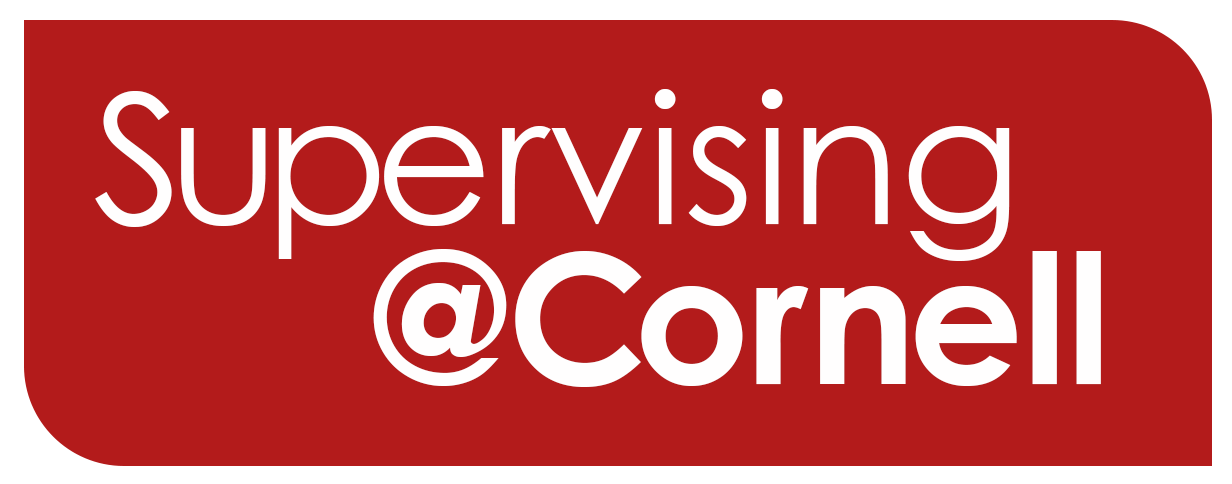Frequently Asked Questions
Do you have to be a supervisor to enroll in Supervising @Cornell?
Any Cornell employee -- staff, faculty, academic, non-academic -- can enroll in Supervising @Cornell. There are no prerequisites or requirements for enrollment. Established supervisors will discover valuable policy and program updates; those new to Cornell will learn about Cornell-specific resources and procedures, and if you're interested in moving into a supervisory role, you don't need to wait!
How much does Supervising @Cornell cost?
The university prioritizes leadership and recognizes the importance of the supervisor-employee relationship in job satisfaction and engagement. Therefore, Supervising@Cornell is offered free of charge to all staff, faculty, academic, and non-academic employees!
Why was Supervising@Cornell created?
These just-in-time, on-demand, short training courses have been created and curated by and for our community in response to the changing needs of supervisors and individual contributors at Cornell. Our intention is that these courses will provide additional resources for staff wherever they may be in their employment life cycle at Cornell: those seeking a supervisory role at Cornell; new to supervising; supplementing current supervisory skills; and updating those who have been at Cornell for years with changes in policy and laws that impact the work of supervision at Cornell.
How are the modules structured?
Each module is aligned to a Leadership Skills for Success, or to the additional topics of Foundational Supervision Skills and Understanding Cornell. A senior leader introduces each curriculum in a short video with a message regarding the identified Leadership Skills for Success (LS4S). Coursework further defines and outlines the specific behaviors of the LS4S with a brief description, underlying principle and benefit, tips for action, a continuous self-learning/action plan, and additional resources such as articles, policies, books, or trainings that could be used to supplement your learning. Additional online activities that dive a little deeper into specific concentrations within the Leadership Skills for Success are provided for those who want to learn more.
Example: In the “Create an Open and Inclusive Environment” module, you will find Inclusion @Cornell, which is a course that defines the behaviors within the LS4S. Targeted Skillsoft, eCornell, or Organization Development and Talent Management (ODTM) developed courses such as Bridging the Diversity Gap, How Culture Impacts Communication, and Wellbeing@Cornell provide a deeper dive into the subject. Additionally, there are learning labs attached to some courses that provide an opportunity to have further facilitated conversations with your colleagues in person or through a virtual classroom.
Where should I start?
Supervising@Cornell is designed to be flexible -- to help you get to the information you want, when you need it. Although you can start with the introduction to Supervising @Cornell and proceed through each module of the entire program, you don't need to take courses in a specific order, or to take every course. You can go into a module and review the material you want in real time, and revisit any section as often as you like. As you develop in your career, you can come back to the online program to review information or register for a learning lab to explore topics in depth when a need arises.
How does Supervising@Cornell fit in with the other development opportunities for Supervisors at Cornell?
Our goal is to provide the training and resources needed in the format that best fits into the life cycle of the diverse group of supervisors we have at Cornell. We recognize that our supervisors and potential supervisors are living and working in many geographical location. We also recognize the differing learning styles of our colleagues. To that end Supervising@Cornell, New Supervisor Orientation Certificate Program (NSOCP), Supervisor Development Certificate Program (SDCP), Administrative Academy, and Management Academy were designed to meet the various needs of our workforce.
We believe that each distinct program provides resources that work independently and can be leveraged together to support the individual needs of our supervisors.
- We see the Administrative Academy being utilized by individual contributors or those who supervise others with an focus on specific skills necessary within the life cycle of staff.
- Supervising@Cornell benefits those looking to be supervisors at Cornell, new to supervising, those supplementing their current supervisory skills, those looking to refresh some of their knowledge, and additionally informing those who have been at Cornell for years but want to see how the changes in policy and laws impact the work of supervision at Cornell. It is possible to complete this catalog completely online or via Zoom but there is opportunity through the Learning Labs to attend in person.
- New Supervisor Orientation Certificate program provides additional and supplemental opportunities to learn essential resources and skills necessary for supervision while providing participants the ability to network and learn from subject matter experts.
- Supervisor Development Certificate Program is a case based program designed to be a deeper dive into the laws and policies. During this four day program, you will discover and practice applying laws and policies to a variety of situations through cases designed to be nuanced. With each case additional policies and laws are included and the dynamics and diversity becomes increasingly more challenging.
- The Management Academy provides additional opportunity to learn and practice skills with others within the University. The in person sessions create an environment where networking takes place as well as a rich learning due to the diverse perspectives that each person brings to the classroom.
- As we roll out the learning labs within Supervising@Cornell and Zoom sessions within the Management and Administrative Academies, we believe we will better be able to provide the opportunity for networking as well as the diversity that comes with engaging with one another in real time to more staff within the larger community of Cornell University.

